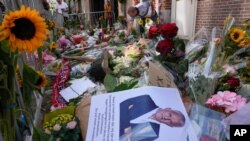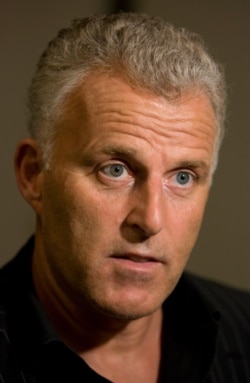Flowers, candles and scrawled notes mark the spot in Amsterdam where star crime journalist and justice campaigner Peter R. de Vries narrowly survived a gun attack last week.
Known for his hard-hitting investigations of the criminal underworld, the 64-year-old was struck in the head by one of five rounds fired as he left a television studio on July 6. De Vries is now fighting for his life in hospital, according to Dutch authorities.
Police arrested two suspects in connection with the shooting that Prime Minister Mark Rutte has described as “incomprehensible,” adding it was an attack on a “courageous journalist” — and on the freedom of the press.
De Vries is a household name in the Netherlands, known for confronting gangsters and drug kingpins, and helping police disentangle high-profile homicides and solve ‘cold cases’ like that of 11-year-old Nicky Verstappen whose 1998 murder went unsolved for over 20 years. De Vries is also famed for his coverage of the abduction of brewing magnate Freddy Heineken in the 1980s.
The reporter has long lived with death threats. Earlier this year he told a magazine he wasn’t scared, saying, “That’s part of the job.”
Local media say that that recently De Vries had been counseling a gangster-turned-witness named as Nabil B, in the murder and racketeering trial of suspected drug kingpin Ridouan Taghi. One of Nabil B’s lawyers was killed 18 months ago, and some Dutch media questioned whether Tuesday’s attack is linked with Taghi’s trial.
Police have not disclosed a motive, but a spokesperson was cited by the Associated Press as saying “several scenarios” are being considered.
The attempted assassination has prompted an outpouring of anger from reporters and media organizations across Europe.
They point to the shooting as yet another incident in a Europe-wide trend where crime gangs — some with links to corrupt politicians — target reporters.
“De Vries was attacked in a country with one of the highest levels of media freedom in the world. That shows that no country is completely safe,” said Corinne Vella, the sister of Daphne Caruana Galizia, a Maltese journalist and anti-corruption blogger killed in a car-bombing in 2017.
Even in countries like Malta and Greece, where journalists have been killed, “it seems public awareness, even institutional awareness, of the threat of organized crime isn’t what it should be,” Vella told VOA.
“People seem to think that it is an Italian problem, or a southern European problem. It’s a transnational problem, and it affects countries — and journalists — across the EU,” she said, speaking on behalf of The Daphne Caruana Galizia Foundation, a nonprofit set up to campaign on behalf of investigative journalism.
The attack on De Vries comes just months after TV crime reporter Giorgos Karaivaz was shot dead outside his home in Athens. He was struck by at least half-a-dozen shots fired by a passenger on a motorbike, in April.
In February 2018, Slovak investigative reporter Ján Kuciak and his fiancee, Martina Kušnírová, were found shot dead in their home in Veľká Mača, western Slovakia. The 27-year-old had been probing economic crimes involving high-profile Slovak businessmen with ties to politicians.
Slovakia convicted two people in connection with Kuciak’s murder and last month ordered a retrial of property developer Marián Kočner, who prosecutors allege was the mastermind. Kočner, who is serving a 19-year sentence in a separate case, was acquitted in an earlier trial. He denies involvement.
Investigative reporter Benedikt Strunz of Germany’s public broadcaster NDR television says the attacks make investigative reporters think twice. “But we all know it would be completely wrong to stop reporting on organized criminals and our answer must be: Such an attack should not pay off,” he told VOA.
“There are some hotspots, like Belgium, the Netherlands, Albania, Montenegro and some other countries, where it looks different. I know colleagues in the Netherlands who are now under police protection. However, we have to realize today that assassinations of journalists are a recurring phenomenon in Europe,” he said.
But, Strunz said, members of organized crime don’t pose the only threat to journalists.
“Statistically, however, one must surely say that the greater danger for journalists in Europe today continues to come from restrictive governments and from right-wing radicals who, for example, beat up reporters at demonstrations,” he said.
In the past year, news crews have reported being harassed and attacked while covering protests over pandemic restrictions or in support of Palestinians, and while covering neo-Nazi movements, rights groups and the Council of Europe safety platform show.
Drugs, organized crime
The targeting of De Vries should be a wake-up call, Strunz said. "We have been experiencing a gigantic cocaine wave in Europe for several years. Europe has now replaced the USA as the top market for cocaine from Latin America. The billions in profits made from drugs in Europe are an accelerant for organized criminals. And I think the danger that this development poses, not only for us journalists but also for society as a whole, has been overlooked,” he said.
Paul Radu, a co-founder of the Organized Crime and Corruption Reporting Project, an investigative reporting platform, believes there is a trend. “The danger of organized crime has been overlooked for sure as the most serious attacks on the press come from the intersection of corrupt politics and organized crime,” he said.
“Journalists and law enforcement mostly tend to deal with organized crime in terms of separate events or incidents because it is hard to see and to keep a check on the continuity and the alliances between crime organizations. We’re now seeing a bit more of these alliances and intersections but it’s still just the tip of the iceberg and the more we’re revealing, the more dangerous it is for reporters,” he told VOA.
Radu worries organized crime is transnational while law enforcement is national. He argues for “EU-wide law enforcement teams” to investigate when journalists are targeted.
Corinne Vella agrees. “Even journalists in ‘safer’ countries will be at risk unless authorities in Europe act to ensure their safety,” she said. In 2017, she and other relatives of Caruana Galizia “warned [the blogger’s] assassination had set a new standard of permissible behavior within the EU, and that others would soon die if decisive action isn’t taken.”
“More journalists have been killed since then,” she said.







